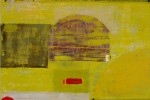Summer 2014: Prose
The Day I Stopped Typing
Non-fiction by Kate Comings
Rain splashes into the flowerpots next to the front walk and cascades down the copper rain chain outside my window. My office smells like wet dog. A trail of paw prints on the oak floor leads to the round cushion beside the desk where Jilly, a red-and-white corgi, dozes. Rain doesn't bother her.
I park myself on the edge of my blue swivel chair and boot up the computer. While it connects to the hospital network and runs its login scripts, I pad out to the kitchen in my pajamas and wool socks. I pour myself some coffee, add plenty of cream, and take the mug back to my desk. I slip my left wrist into a black elastic brace and cinch it tight. My job requires a lot of keyboarding, and pain shoots from my wrist up to my elbow every time my thumb hits the spacebar if I don't wear the brace.
My office is cozy with tall bookshelves and lots of plants. Philodendrons climb the walls. Outside the window in front of my desk, a flock of tiny gray birds lights amid a tangle of honeysuckle vines. Water droplets fall from the dark green leaves. I pause to listen to the birds' conversation, a busy chorus of sharp "Psst-psst-psst" chirps before I slip on my headset and start the day's work.
I do medical transcription for a large hospital system. Doctors dictate admission histories, physical exams, surgeries, and tests done on their patients. I listen to the sound files, transcribe them on the computer, and upload the reports to the patient's chart.
I'm in the middle of transcribing an MRI of the brain when an email with a red exclamation point pops up at the bottom of my computer screen – "Urgent! Please read!"
I hate being interrupted. I stop to massage my shoulders before I double-click that little yellow envelope. It's a summons. The wording of it tells me this will be no ordinary staff meeting; it's not the usual perky, "Hello, team! We're going to have a teleconference to discuss department milestones." No. It's a "You are required to present yourself to a mandatory meeting at 3:30 p.m. on Monday in conference room 203 at the Davis Building." Monday is my day off. My shoulder muscles clench into hard balls as I stare at the monitor. This is bad.
When I first got hired, I thought I'd found my dream job. I got to work at home. A whole group of us were hired at the same time to be part of a brand-new hospital – the first in the region to dispense with paper charts and pioneer the electronic medical record. The doctors valued us and sent emails praising our skill, and we were all proud to be part of an elite, cutting-edge team. I thought I'd be at that job until I retired; I forgot that nothing lasts forever. But as the economy turned sideways, we started not to matter anymore. They've already laid half our department off, expecting the rest of us to work twice as hard. They raised the minimum amount of work we have to produce, and they've got software to monitor every minute we spend researching, getting up to use the bathroom – any time we're not pounding that keyboard. "At least I have a job," I keep telling myself. I'm working harder than I ever have, full speed eight hours a day to keep up. I do my best to ignore the twinges of pain, but my fingers won't move as fast as they did when I was younger.
I don't need the formal meeting to tell me what's coming. I have to go in on my day off so they won't lose that last bit of productivity from my sore fingers. Most of us work from home via a remote connection to the hospital network. It's one of the best things about the job. I wear whatever I please, and my commute to work is just a matter of footsteps. It has been over a year since we had to go "in house" for a meeting. All our staff meetings now are conference calls over a phone hookup hosted by an out-of-state company. Having to show up in person feels like being in my pajamas in the middle of an intersection with cars bearing down on me from all directions.
* * * * *
I tug on my soft, green, stretchy yoga pants. I'm shaky and off balance – I trip on the pants and stumble before I catch myself. I've lost my center. I light candles. I get my mala, a string of holy beads, from my bedside table and sit on my sage-green zafu meditation cushion facing the coffee table where I've set up a little altar on a purple silk paisley scarf. There's a jade plant in a plain brown pot. Fat round leaves spread out above a statue of Lord Shiva sitting cross-legged, a cobra around his neck, his trident beside him. Candles clutter the table surface. An abalone shell holds smooth stones I've picked up over the years. A wooden flute lies next to the altar. Jilly curls up next to me, warm against my leg. I close my eyes and focus on my mantra. The beads slip through my fingers. They are deep brown rudraksha seeds with grooves and little squiggles that make each one look like a miniature human brain.
I read somewhere that there are as many neurons in the brain as there are stars in the universe. We use only a tiny percentage of our brain cells at any one time, but we possess as many as the stars. So in some weird way, is my brain a reflection of the universe? What about this mala? I hold in my hands 108 tiny human brains. I wish they would tell me what to do.
I catch myself far away from the present moment and come back to the mantra, "Om Namah Shivaya … ." But my mind is fast. It jumps in with its frantic chattering – I'm going to lose my job! My stomach clenches. I know it’s going to happen this time – it's not just some groundless worry. A cold fog spreads through my chest and down my arms. My breathing goes shallow and my fingers freeze on the beads. What am I going to do? I'm too old – nobody else will ever hire me, not that I want to work for some miserable employer ever again – but I'll lose the house! God, help me! Shiva – Jesus – Mary – Buddha – anybody! Somebody tell me what to do … nobody's here. There's only me; my prayers crash against the wall. They slide to the floor and lie there like dead moths. But sometimes I do feel that divine presence, the grace that holds the world. Don't I? Or am I making it all up?
I breathe. I go back to my mantra again and again until, at last, the storm in my head subsides, and all is quiet and peaceful
* * * * *
I push open the door of conference room 203. It's a wood-paneled boardroom with a long table. Several older women stand around chatting. I've never seen any of them before, and I wonder if I'm in the right place. "Are you here for a meeting with Sylvia?" I ask them.
"Yep," a trim woman with close-cropped, iron-gray hair says. "I'm Bobbie." She doesn't smile.
"I'm Kate, from Memorial."
"Oh. We're from Willamette Valley," she says. There's a murmur of "Nice to meet you," and they all introduce themselves.
"I expect we all know why they called us in," says Jill, a stately African American woman in a luxurious gray silk blouse.
I nod. "I don't see what else it could be." We don't speak that word, "layoff." We talk around it.
"How long have you been working here?" asks Fran. Her penciled-on eyebrows, arched high above worried brown eyes, give her a hurt, surprised look, as if someone had just slapped her.
"Five years," I say.
"I've been here for sixteen years!" Fran's face crumples. She turns away and rummages in her worn, brown plastic purse. "Oh damn! Has anybody got a tissue?" I fish a packet of Kleenex out of my raincoat pocket and hand it to her. Jill puts her arm around Fran's shoulders. "I know, baby. I know."
"It's ten years for me," says Gladys. Her long, dark braid is streaked with gray. My own hair has gray steaks as well. I had it trimmed this morning.
The door swings open and Sylvia, the department director, steps into the room. With her is a skinny, much younger woman with masses of wavy blonde hair. I'll bet she has hair extensions.
"Hello, everyone," Sylvia says. "Are we all here?" She gives each of us a brief glance. "Yes, we are. So – we might as well get started." The two of them sit down on one side of the table and the rest of us squeeze up next to each other across from them.
The air is stuffy in here; it smells just like the typing room at my old high school. I hated that class. It was crowded and stifling. The keys on the clunky manual typewriter were greasy and I could hardly bring myself to touch them. Sylvia, the director, is in a tight navy-blue dress with a cowl neck. She has frosted her lanky black hair since I last saw her, and she has those long, squared-off fake nails. In spite of her meticulous grooming, she looks unwashed. She shuffles a stack of papers and clears her throat.
"I know this is a difficult time, and I'd like to introduce Alice Paulsen from Human Resources." She sweeps her arms toward the blonde like a game show hostess. "She'll explain the process."
After that, she lets Alice do all the talking. We're being let go. I do not pay attention to what Alice says. I can’t get over the way she looks just like a doll, Plastic Surgeon Barbie maybe, wielding her scalpel to trim us away like unwanted fat. Words float by: "needs of the organization," "revenue cycle," "strategic priorities," "reduction of hours." She hands each of us a packet. "Look this over. It explains the process fully and you'll most likely find answers to any questions you might have. But don't hesitate to call if there's anything you don't understand."
She slides five business cards across the polished table surface. I take one. In embossed, shiny black ink below the company logo it says, "Alice Paulsen, Facilitator, Human Resources." I hold back the snort that wants to burst out of my nose and search in my purse for a pen. I cross out "Facilitator" and write "Terminator" before I slip the card into my packet. Firing us takes a little over fifteen minutes, and when Alice and Sylvia snap their folders shut and get up to leave, I feel stunned and a little shaky, but also relieved, as if I've just made it through a grueling job interview. The two of them trip across the room in their spike heels and the door swings shut, leaving us, now officially jobless, to pull ourselves together.
None of us gets up right away. No one is crying, not even Fran. Now that it has happened, everyone is calm. Next to me, Bobbie shuffles through her packet, then stuffs the sheets of paper back inside. After a moment, Jill lets out a loud sigh, pushes her chair back and stands. "Well, it was nice while it lasted," she says. The rest of us get up and follow Jill out the door. In the hallway, we go in different directions. I don't know how the others feel, but I'm free. No more constant monitoring. No more long hours pounding the keyboard. And especially, no more being treated like a machine to be used up and discarded. I can't wait to go out in the rain and breathe the clean air.
* * * * *
It's a beautiful autumn night. I shrug into my coat and take Jilly out for a short walk. She tugs on her leash and we turn down an unpaved side street. My boots crunch on wet gravel. The moon, just a couple of days past full, is surrounded by a circle of clouds in the center of the sky. The wind carries a soggy, earthy smell from the afternoon rain, with a hint of juniper. A cricket sings in the dark, the high-pitched thrum like a glass wand rubbed on a tiny washboard. The moon's reflection lights up a puddle in the road, and when I look up, the clouds have formed a mandala.
| |

|

|
 |
 |
 |
 |
 |
||||
|
Sweet, evocative, haunting: Delight in 19 poems to please every palate. |
What does it take to be a woman, sister, mother, child, lover and friend? Share the struggles six non-fiction writers have with these roles. |
Five local artists, a variety of media, and new insights into our world. Enjoy the unique visions of these extraordinary women. |
Savor the poetry and prose of five talented young authors whose voices you will want to hear again and again. |
Meet the 25 authors and 5 artists whose voices and visions enliven the fifth edition of our journal. |

